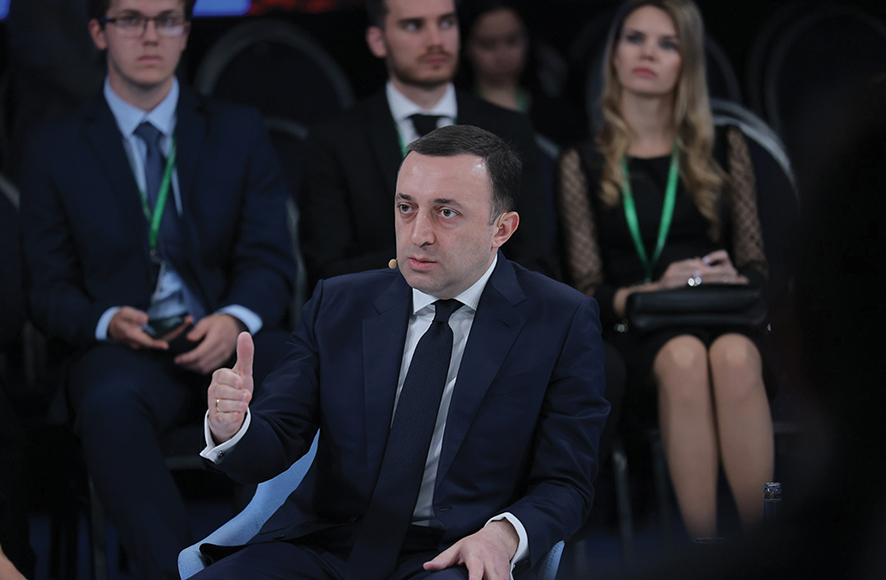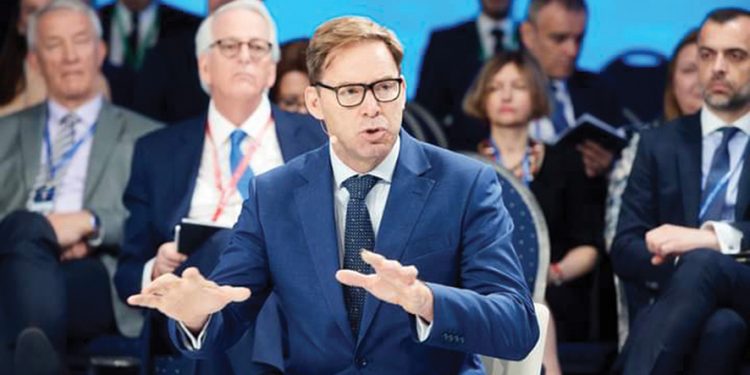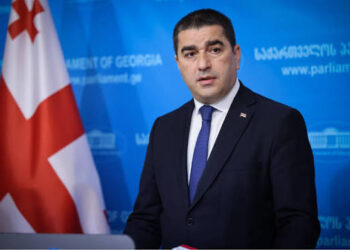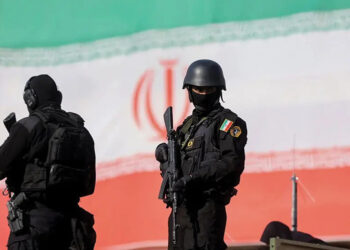Among the reactions that followed the response of the Prime Minister of Georgia, Irakli Garibashvili, to the question, “Why did Russia invade Ukraine in 2022” at the GLOBSEC conference in Bratislava, was one of indignation from Tobias Ellwood MP, a British parliamentarian and former military, and the Chairman of the British Parliament’s Defense Select Committee: “Disgraceful to hear Prime Minister of Georgia (a state seeking membership of NATO & the EU) blame NATO for Russia’s invasion of Ukraine. This shows Putin’s coercive influence and how seriously unstable Eastern Europe has once again become beyond Ukraine.” The RFE/RL Georgian Service reached out to him for further insights on the matter.
PM Garibashvili’s speech at GLOBSEC shocked everybody
“PM Garibashvili’s speech at GLOBSEC shocked everybody here, really, quite astonishing,” Ellwood tells us. “The one country you would expect to be 100% supportive of Ukraine’s situation is Georgia – Russia has taken a couple of chunks out of the country. And here we have a prime minister, blaming NATO, an organization that Georgia seeks to join, for the Ukrainian invasion. It’s taken everybody by surprise. And I certainly hope that he will retract those comments. Otherwise, it will damage Georgia’s reputation in seeking membership with the EU and, of course, NATO. It suggests something more sinister going on here, that Putin has got to him, that he’s trying to hedge bets with both sides of where this war may go. And that is an insult to democracy, to European security, and all the work that has been going on to support Ukraine.”

It may well have been shocking, but at the end of his discussion, there was widespread applause. Was this applause for his participation in the event, or for what he had to say?
No, it wasn’t applause for him. There was respect and applause for the event. It certainly wasn’t directed at him. Nobody, absolutely nobody here at this conference supported his position. And for a prime minister to say this, I think is irresponsible and dangerous – it will set Georgia back unless it’s corrected, if Georgia’s plans to join the big European institutions.
Do you think you were the target audience for this performance or was it music written for an entirely different audience?
I think he was talking to Moscow. He was directly appealing to President Putin that he’s there and should the war go the wrong way, he will want to have a relationship in the same way that Viktor Orban has. Those are the cards he showed today.
Is this Realpolitik pragmatism that we are dealing with here? Is this a Machiavellian prince thinking of his vulnerable country first and foremost? Because it looked like he was going for that angle.
Well, there’s no angle to take with Russia, other than to condemn an unprovoked invasion of another country. And this is what I think is surprising everybody here – it first happened in Georgia, this was the start of Russia showing its wider intentions to expand its influence. What surprised us was that it wasn’t Serbia saying this. Had it been Turkey or Hungary, then perhaps it would have been less of a surprise, but for Georgia to come out and say these things, to hear those things from the Prime Minister of Georgia, that’s what was truly shocking.
Let’s dissect his statement point by point, shall we? First, Ukraine’s will was to get into NATO. Second, Russia invaded Ukraine for “wanting to get into NATO.” Is the unspoken equation here that wanting to get into NATO means war from Russia?
That’s far too simplistic, that really is like a schoolboy understanding of the geopolitics. Russia is increasingly a geopolitical threat to the Western way of life. Even Finland, who had walked a very, very careful line, not wanting to upset their neighbors, feels that the security situation has now tipped so badly that they feel they need the umbrella of security from NATO. Why do you think Georgia wants to join NATO? They want the support. They don’t want to be invaded. It’s as simple as that. Countries who don’t want to be invaded, they join security alliances. That’s the way it works.
Despite the ire at Globsec and from western opinionmakers in general, in Georgia there is a justified disillusionment with how the West handled the 2008 war. And it can be a very powerful argument to stoke anti-western sentiment. What would you tell those who feel let down by the west?
That is fully understandable. And I think there’s a lot of soul searching in the West as to why we did not do more to assist Georgia, there’s no doubt about it. We were too timid, too complacent after the end of the Cold War in the 90s. And we weren’t geared up to it. And we got distracted by Iraq and Afghanistan. So, it’s understandable that that’s the feeling and response from Georgia, but it doesn’t then justify the Prime Minister’s comments when the West now steps up to the plate, finally plucking up the political courage to stand up to Putin.
What would you say is at stake for Georgia? So far, Georgia has continued its efforts to navigate. When one has to pick a camp to be in, what is there on each side?
Georgia needs to look in the mirror and ask “Where do we stand? How does it look internationally?” It’s not a good position in this day and age, when it’s seeking greater strength and relations with the West, if it starts providing indirect support for Moscow.
Interview by Vazha Tavberidze for RFE/RL














